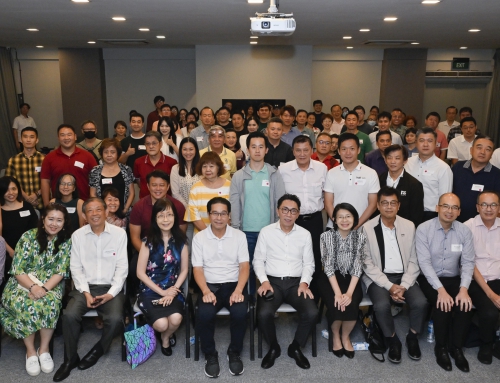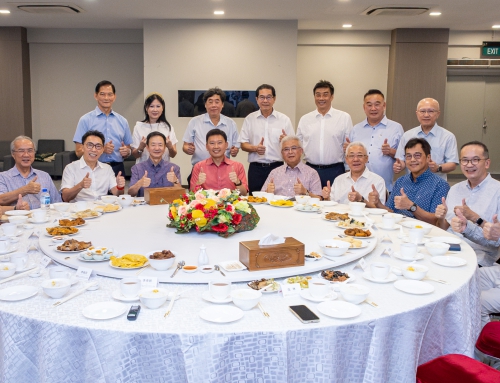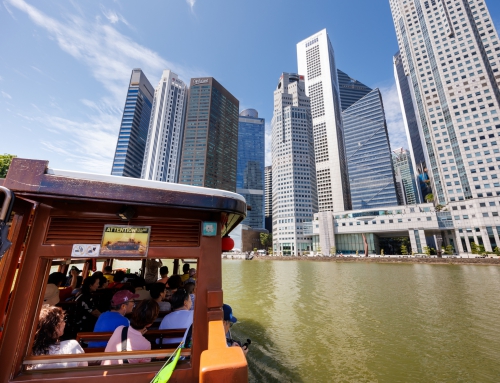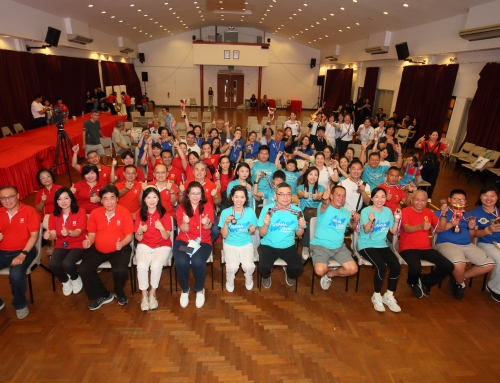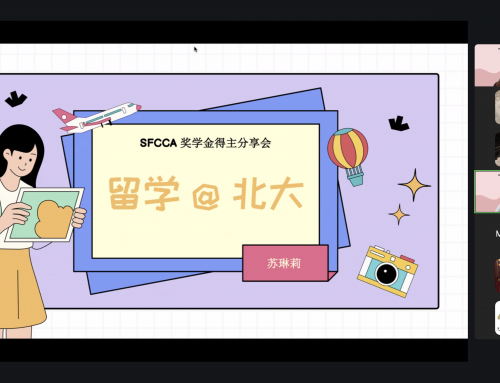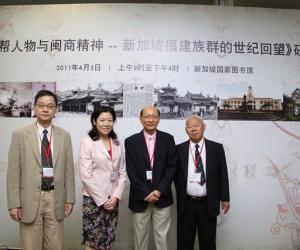
(From left to right) Dr Lee Pui Tak, Dr Su Wenjing, Mr Kua Bak Lim and Professor Yang Jin Fa shared unique perspectives on the Hokkien culture and the essence of Hokkien business
3rd April 2011 – The seminar on “Hokkien Personages and the Essence of Hokkien Business – A Hundred Years of Singaporean Hokkien Community” successfully drew its curtains at the Possibility Room in the National Library. The seminar was jointly organised by the Singapore Federation of Chinese Clan Associations (SFCCA) and the National Library Board (NLB), and was sponsored by the Singapore Hokkien Huay Kuan. The seminar was well received, with 180 participants in attendance. President of SFCCA, Dr Chua Thian Poh, Deputy Secretary-General Mr Perng Peck Seng and council member Dr Lee Peng Shu also attended the event. The seminar brought together four speakers from Singapore, Australia, Hong Kong and Fuzhou (Fujian, China) respectively.
Mr Kua Bak Lim, chief of SFCCA research and publication committee, presented on the topic The See Family, Lat Pau[1], and our Hokkien Community Culture, recounting the life of See Hoot Kee, a pioneer in the Singapore Hokkien community. Besides being treated to a vivid description of the achievements made by the See family, participants also learnt about the changes in the calendar systems used by Lat Pau (using calendars from periods like the Qing dynasty, the Yellow Emperor, and the early era of the Republic of China etc.). They used it as a doorway into history by immersing participants in the past, allowing them to understand how significant moments in history shaped people’s thoughts towards changing times.
The second discussion, Thian Hock Keng Temple and the Executives of Singapore Hokkien Huay Kuan (1840-1949), was led by Professor Yang Jin Fa from the Department of History in Flinders University, Southern Australia. Professor Yang explored the evolution of the organisation and its structure, and evaluated the successes and contributions of its executive management. He then concluded that the key factors that allowed the executives of the Hokkien community to survive, improve and develop during the colonial era are: the qualities that the executives possessed, the structure of the organisation, the willingness to reform and the tradition of “Yuan Shou”. Using Tan Kim Ching and Tan Kah Kee – the two most influential businessmen of the Hokkien community as examples, Professor Yang explained in detail how both leaders had a charisma that stemmed from their common traits of “wealth, talent and fraternity”, as well as a spirit of philanthropy.
Dr Lee Pui Tak, a researcher and assistant professor of Institute for the Humanities and Social Sciences in University of Hong Kong, led the third discussion, The Expansion and Conflicts of Overseas Chinese Merchant Networks—— Rivalry between Aw Boon Haw and Tan Kah Kee. He compared Tan Kah Kee and Aw Boon Haw, the two famous Singapore’s Hokkien businessmen and conducted detailed textual research regarding their interactions, analysing their similarities and differences in managing their businesses.
Dr Su Wenjing, a professor at Fuzhou University as well as the Dean of Hokkien Business Culture Academe, led the discussion on Historical Contribution and Practical Significance of Hokkien Entrepreneurs. She examined Hokkien businesses in the context of Chinese culture as a whole and shared about Chinese marine culture based on the concept of the “Greater Fujian”. Dr Su drew connections between various historical landmarks and events such as the Maritime Silk Road and Zheng He’s maritime voyages. Her engaging presentation inspired the audience greatly, motivating them to volunteer more questions to enrich the discussion.
As the seminar drew to an end, Mr Giam Meng Tuck, deputy editor-in-chief of Lianhe Zaobao, hosted the Q&A segment, which saw the four speakers taking questions from the floor. The audience’s active participation paved the way for an engaging discussion, ending the seminar on a high note.
[1] Lat Pau is one of the earliest Chinese-language newspapers published in Singapore.

